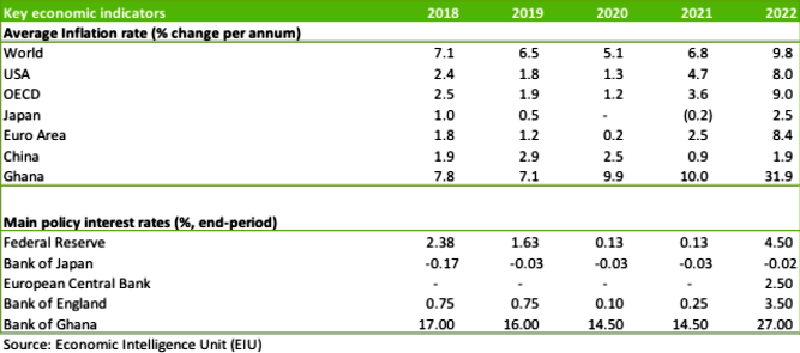
Declining economic conditions: Impact on business valuation (1)
Economies around the world have witnessed slow growth resulting from the spillover effect of the global COVID 19 pandemic and its related economic restrictions. The outbreak of the Russia-Ukraine war in February 2022 made this situation worse by intensifying supply chain interruptions, raising the cost of food, energy and other essential commodities.
Inflation has risen sharply around the world, prompting major central banks to raise policy rates. Rising policy rates began in the second quarter of 2021, when some central banks in Latin America and Central Europe focused on curbing inflationary pressures and the attendant impact on currency – when inflation increases, the purchasing power of money reduces. In other words, consumers can buy less goods with same amount of currency.
This trend was sustained in 2022 as the Federal Reserve System (U.S. Fed) and other major central banks across the globe continued to increase interest rates at a pace faster than experienced in the last five decades.
We have witnessed similar macro-economic trends in Ghana as the headline inflation rate rose from 12.6 per cent in December 2021 to 54.1 per cent in December 2022, which was the highest reading since May 2001 (41.51%). The high inflation rate in Ghana could be attributed to rising food and transportation prices, disruption in food supply chain, as well as the persistent depreciation of the cedi. According to the Bank of Ghana (BoG), the Ghana Cedi depreciated by about 30 per cent against the U.S. dollar in 2022, with knock-on inflationary effects given Ghana’s high dependence on imports. As a result of the inflationary pressures, the BoG maintained a contractionary stance, increasing interest rates to 28 per cent in January 2023, from 14.5 per cent in January 2022.
Implication of rising inflation, interest rates on businesses
In the face of global inflationary pressures, nations are faced with conflicting priorities to maintain domestic price stability and ensure economic growth. The interest rate is one of the most important tools used by central banks to manage the flow of money and output. A change in interest rate has an overarching impact on the economy as well as other key economic indicators such as consumer spending and borrowing.
Rising inflation impacts businesses in other ways such as increased production costs and profitability margin erosion, especially where costs cannot be passed on to consumers. Most central banks have raised interest rates in response to higher inflation rates to help with the reduction of inflationary pressures. However, the rise in interest rates affects firms’ cost of borrowing as debt becomes more expensive and results in higher default rates. Increased costs of borrowing could also put a strain on the entities’ cash flow and there could be breach of key debt covenants contained in debt agreements.
Furthermore, rising interest rates tend to negatively affect stock markets, as they are a leading indicator for slow economic growth. For context, the U.S. equities markets (S&P 500 Index) has declined by 19.95 per cent in 2022 (as at December 2022) as the U.S. Fed has consistently raised benchmark interest rates from a range of 0 per cent- 0.25 per cent at the start of the year to 3.75 per cent - 4.5 per cent as at December 2022. Higher interest rates can have a negative impact on the future earnings of companies, especially those that rely on borrowings with potential impact on share prices as well.
With rising concern around global economic conditions and the local economy, it becomes imperative for entities to test assets for impairment. Among the listed companies on the Ghana Stock Exchange, financial services providers recorded the highest amount of impairment as at September 2022.
Companies in Ghana are currently facing the triple challenge of rising inflation, rising interest rates and persistent currency depreciation which present short to medium term risks for majority of businesses. Some of these risks include but are not limited to:
•Dwindling margins resulting from input cost pressures, especially when this cannot be passed to customers
• Higher cost of capital and limited incentive to invest in longer term capital projects
• Foreign exchange losses (relating to companies that import their inputs)
• Pressures on revenue and profits following erosion of purchasing power
Consequently, to properly comply with the requirements of the International Financial Reporting Standards (IFRS), it is important that assets should be tested for impairment regularly.
The writers are: Partner and Financial Advisory Leader; and Manager and Team Lead, Valuation & Modelling, Deloitte Ghana